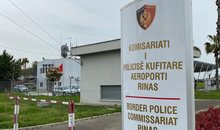
 Flash News
Flash News
Suspected of being murdered, photo emerges of 23-year-old found dead in Shkopet lake
Theth action, resident in tears: I built on my land with my life's expenses, the state should not destroy it
Directors targeted! After Fier and Durrës, Rama arrives in Elbasan
Name/Identification of the 23-year-old found dead near Shkopet Lake
IKM action in Theth, residents come out in protest
Money laundering, individuals the largest potential group, then business, the highest risk scenarios

The National Strategy for the Prevention of Money Laundering and Financing of Terrorism 2024-2030 has been part of the tables in recent weeks regarding the policies and measures that can be taken to combat the phenomenon.
In this document, which was for consultation until a few days ago, a part of the presentation is dedicated to the findings that came from the National Risk Assessment, where subjects involved in activities with potential money laundering were analyzed. Thus, according to a passage included in the strategy, it is underlined:
Resident individuals: In Albania, they continue to be the largest group of subjects involved in activities with money laundering potential.
The highest risk scenarios related to individuals are:
• Purchase of assets from an unknown or unjustified source;
• Taking advantage of frequent and small value transfers from individuals without a clear connection between them;
• Depositing cash amounts from an unknown source in a bank account;
• Purchase of real estate under value and revaluation within a short time;
• Financial actions (deposit/transfer/investment in immovable/movable property) by persons suspected of being involved in criminal activity;
• High value investment in real estate through the use of third parties;
Resident legal entities: They continue to represent the second largest number of subjects involved in the potential activity of the PP, mainly with a source of income from crimes in the tax field, fraud, organized crime, corruption where the main scenarios include:
• Placement of funds of unknown origin in real commercial circulation;
• Investment in real estate in the name of the existing company owned by persons suspected of being involved in criminal activity at unjustified values with legal sources;
• The benefit of large transfers to the business account of the person suspected of being involved in criminal activity from society without a clear connection between the service/goods offered and the payment;
• Involvement of a single individual in several entities that have the same object of activity or the same address and carrying out transactions without a clear connection between the parties to the transaction;
• Suspicious transfers received on account of a company that has no real economic activity;
• The use of legal entities for the benefit of transfers from abroad through fraud where the vast majority of funds are channeled abroad and a part is withdrawn in cash;
Non-resident individuals: The main scenarios related to this category are:
• Creation and registration of resident legal entities and the use of their bank accounts for receiving or sending transfers from/to different jurisdictions without a clear connection with the object of the company's activity with suspicions mainly related to fiscal evasion;
• Realization of mainly residential investments without a clear source of income.
Resident PEP: Due to their function, the suspected cases related to PEP are when the original offense is estimated to have been "Misuse of duty/Corruption" and among the main scenarios are:
• High value investments in a business after the end of the duty (former PEP) without a clear source of income or even the declaration of high immediate profits from a business owned by a former PEP;
• High turnover of funds in individual accounts from PEP declared by the business, but not justified by the income of the business;
• Investments in real estate after leaving office without a clear source of income;
• Investments in property from PEP with declared value below the market price;
• The initial placement of administrators/legal representatives but also of partners of legal entities with no record of criminal activity, but obviously without proper preparation in economic or educational culture to own or develop such commercial activities, which are de facto owned by PEP and which are then passed on their behalf. A part of these companies, in sporadic cases, are involved in the field of public procurement./Monitor
Latest news



The head of the Rinas police station is reconfirmed in office
2025-07-09 11:25:03


Found dead in Shkopet Lake, 23-year-old has injuries to his throat
2025-07-09 10:41:39


Hoxha: We will have a parliament that will surpass any comedy program!
2025-07-09 10:10:32

Directors targeted! After Fier and Durrës, Rama arrives in Elbasan
2025-07-09 09:53:57
Name/Identification of the 23-year-old found dead near Shkopet Lake
2025-07-09 09:42:34
IKM action in Theth, residents come out in protest
2025-07-09 09:34:54
Reasons why the EU has not imposed new sanctions against Russia
2025-07-09 09:18:35
DW: Online scams increase human trafficking
2025-07-09 09:01:29

Reported missing by his father, 23-year-old found dead near Shkopet lake
2025-07-09 08:42:13

Horoscope, what do the stars have in store for you today?
2025-07-09 08:25:44
Sun and rain, Wednesday with unstable weather
2025-07-09 08:06:58
Posta e mëngjesit/ Me 2 rreshta: Çfarë pati rëndësi dje në Shqipëri
2025-07-09 07:52:02

Tabaku: Salianji bore a political cost that no one in Albania has borne
2025-07-08 22:36:15


Sekretet për të shijuar verën si një ‘profesionist’
2025-07-08 21:45:06


Albania's Waste Crisis: Toxic Smoke and Deep Governance Problems
2025-07-08 21:13:07
Alarming pollution in Fushë-Arrëz, copper factory waste turns the Fan River red
2025-07-08 21:07:14

Poll/ How do you assess the Prime Minister's intervention in local government?
2025-07-08 20:40:01
28 arrested in Italy and Spain for drug trafficking, including an Albanian
2025-07-08 20:24:14
Residents clash with police in Theth: We are on our land
2025-07-08 20:11:41
Death of 27-year-old in Lipjan, Osmani: To be investigated independently!
2025-07-08 20:06:52
Trump promises US will send more weapons to Ukraine
2025-07-08 19:54:25

EU targets health, education, police and cadastre as areas of corruption
2025-07-08 19:23:34




Salianji after his return: I did not oppose for functions, but for vocation
2025-07-08 18:23:15
Will he run in the 2029 elections? Here's how Salianji answers
2025-07-08 18:16:09
Boat captain drowns after diving into water to save two tourists in Shkodra
2025-07-08 18:05:12
Salianji from the DP headquarters: I brought a drug trafficker to justice
2025-07-08 18:03:26
After Fier, Rama "landes" in Durrës, dismissals expected
2025-07-08 17:53:32
Ervin Salianji arrives at the blue headquarters, welcomed by supporters
2025-07-08 17:45:12

EU approves final steps for Bulgaria's Eurozone membership
2025-07-08 17:43:06

Zhupa after Salianj's release: Inspiration for every opposition member
2025-07-08 17:19:39
Actor David Killick passes away
2025-07-08 17:09:23



Threatened with dismissals, Rama arrives at the Fier municipality
2025-07-08 16:39:19
Extreme temperatures temporarily close Acropolis in Greece
2025-07-08 16:30:34

A plot of cannabis is discovered in Mazha, Kruja
2025-07-08 16:13:48

Republika Srpska allocates additional 22 million euros for lobbying in the US
2025-07-08 15:52:04

Spices that protect you from mosquitoes!
2025-07-08 15:30:03

Accident on the Vlora-Qeparo axis, one injured
2025-07-08 15:11:52
Berat, 17 years part of UNESCO's world heritage
2025-07-08 15:03:30


Cost of living increases, inflation rises to 2.4% in June, driven by food
2025-07-08 14:29:54
VIDEO/ Restaurant roof collapses in Italy, one victim and ten injured
2025-07-08 14:18:44
Requested release from cell, Supreme Court leaves Veliaj in prison
2025-07-08 14:07:41
TikTok shutdown/ Austrian media: Rama benefited politically from the app ban
2025-07-08 13:48:25
Acropolis temporarily closed due to heat
2025-07-08 13:31:09



Salianj's release/Berisha: He was politically condemned by Rama and Xhafa!
2025-07-08 13:00:13

Knife attack on Peshkopia Boulevard
2025-07-08 12:44:10


Fier Court decides on the conditional release of Ervin Salianj
2025-07-08 12:15:23
Cost of living increases, inflation rises to 2.4% in June due to food
2025-07-08 12:00:16


Requesting conditional release, Ervin Salianji arrives at the Fier Court
2025-07-08 11:16:36
The first phase of university applications begins today
2025-07-08 11:10:52
Fire in Lura, flames endanger the National Park
2025-07-08 10:53:43
Trump warns of 35% tariffs on Serbia and 30% on Bosnia and Herzegovina
2025-07-08 10:37:32
Thethi rooster and the dung cock
2025-07-08 10:24:01

Fire in Dukat endangers Llogara National Park
2025-07-08 10:01:39
International drug search: 36-year-old arrested in Durrës (NAME)
2025-07-08 09:50:48
Thethi, tourists "criticize" modern trend
2025-07-08 09:39:54
Fire on Mount Dukat still active, Llogara National Park at risk
2025-07-08 09:28:12
Veliaj's appeal to be heard today in the High Court
2025-07-08 09:16:02
"Bad sign for democracy"/ Parliament neglects reporting by institutions
2025-07-08 09:04:56
Today's hearing at the Fier Court, Salianji requests conditional release
2025-07-08 08:56:39
